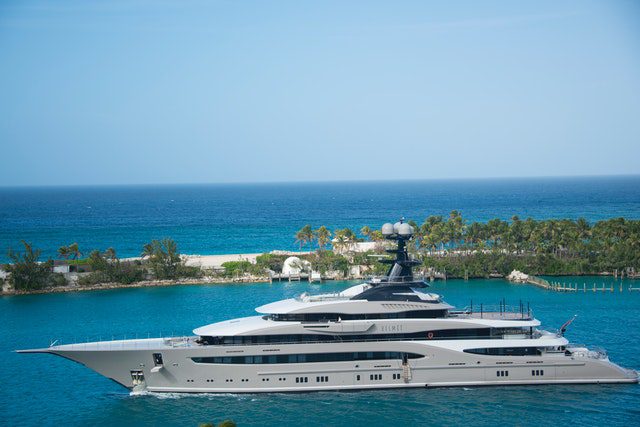Someone once quipped that buying a boat is the equivalent of standing in a shower, ripping up hundred-pound notes. The witty remark was, of course, referring to a small jet boat – anyone who has ever owned a yacht knows that in all likelihood a zero (or three) ought to be added to the notes referred to in the gag. There is no doubt that buying and owning a yacht involves a significant capital injection. However, there are ways you can operate your yacht as a business, enabling you to plan for tax and minimise legal wrangling with foreign jurisdictions.
One of the ways a yacht can be turned into a commercial venture is through setting up a charter business, operating at times when the owners are not using the vessel.
Although achieving the goal of commercialising your yacht for tax purposes is relatively straightforward, it does require careful planning.
Forming a partnership or a limited liability company to purchase your yacht
Many yacht buyers belong to a syndicate, which is essentially a group of buyers acting together to apportion the amount of capital and therefore the risk attributable to each participant. Not only does this allow for the capital requirements of the initial purchase of the boat to be shared, but members can also divide the day-to-day running costs associated with their vessel such as mooring and maintenance.
The syndicate can choose whether they wish to purchase the yacht as a limited liability company or a limited liability partnership (LLP). Chartering the boat will require crew to be hired, and additional insurance to be purchased. These running costs associated with the vessel can be paid for by the company. In addition, depending on the jurisdiction, creating a limited liability company can have the added benefit of providing a level of anonymity for the owners.
There may be possible VAT and Capital Gains Tax savings on the purchase of a yacht if you plan to use it for commercial purposes (although this should be discussed with an account or tax advisor).
Methods of funding your yacht purchase
Depending on its size and make, buyers may have to make a sizeable investment in purchasing the yacht.
As mentioned, pooling funds through a syndicate of buyers can help spread the purchase price among a number of people.
In addition, where the cash is not readily available and the buyers prefer not to liquidate other assets, they can consider taking out a securities-based loan for the purchase. The security can either be the yacht itself or another asset owned by the buyers.
It is worth keeping in mind, however, that where the value of the yacht is expected to depreciate and the loan amount is based on the value of the yacht at the time of the purchase, the borrowers may need to make up any shortfall that results from the asset’s depreciation.
Ensuring your yacht charter business is compliant with domestic and international regulations
When it comes to running a yacht chartering business, compliance with local and international regulations and conventions can be a headache. Fortunately, investing in knowledgeable, professional advisors can reduce the stress of maintaining compliance and ensure you are always up-to-date with any changes in the law.
Some of the conventions you will need to be familiar with could include:
MARPOL (International Convention for the Prevention of Pollution from Ships) – this is one of the most important international marine environmental conventions, and all vessels flagged under a country which is a signatory to it must abide by its rules. This includes most major ports in Europe and abroad, making it important to ensure that your vessel complies with the latest emission standards.
COLREGS (International Regulations for Preventing Collisions at Sea) – sometimes referred to as the ‘road code’ of the sea and sets out the rules for sailing and navigation. The UK version of COLREGS is set out by the Maritime and Coastguard Agency (MCA), in the Merchant Shipping (Distress Signals and Prevention of Collisions) Regulations of 1996.
SOLAS (Safety of Life at Sea) – this was drafted following the Titanic disaster, this convention applies to vessels over 24 metres in length and which are sailing in international waters. It stipulates how many lifeboats must be on board, safety policies and procedures and rules governing distress signals, and voyage planning. Compliance takes on additional importance when obtaining insurance for your vessel, especially when operating as a business.
The Athens Convention relating to the Carriage of Passengers and their Luggage by Sea, 2002 – this convention states that the carrier is liable for damage or loss suffered by a passenger if the incident causing the damage occurred during the carriage and was due to the fault or neglect of the carrier. In other words, it is presumed that the carrier is liable for damage or loss unless they can prove otherwise. The convention also mandates for compulsory insurance. This is an important factor important to consider if the nature of your yacht business is to hire the vessel and crew out for private voyages.
International Convention on Standards of Training, Certification and Watchkeeping for Seafarers (STCW) as amended, including the 1995 and 2010 Manila Amendments – this convention sets out the minimum training, qualification, and watchkeeping requirements for masters, officers and watch personnel. It may be prudent to ensure that all staff serving aboard the vessel are suitably qualified and certified by relevant bodies prior to the hire.
As well as maintaining compliance with domestic and international regulations and conventions, you will need to run the charter business in a professional manner. As with most commercial ventures, it is important to have a detailed business plan, setting out forecasts of how much you will charge for a charter, your operating costs such as mooring, staff, insurance, and a sound marketing strategy.
Establishing a charter business can be an effective way of managing the costs of owning a yacht and can have advantages from a tax perspective. By investing in specialist advisors to assist you in setting up your venture, you can be confident it will be a success, and help to ensure that your business life will be smooth sailing.

